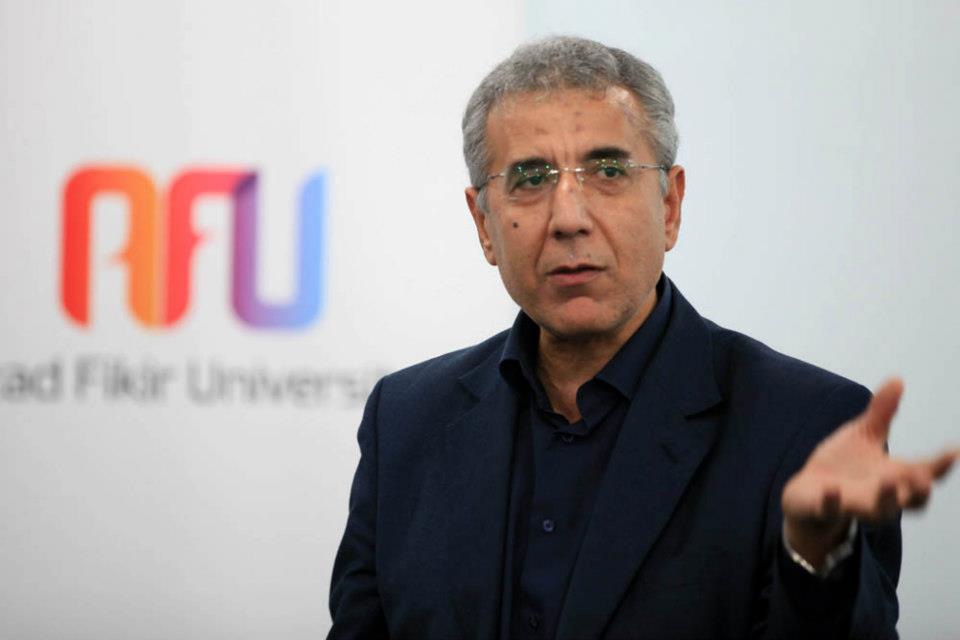Index relies entirely on the support of donors and readers to do its work.
Help us keep amplifying censored voices today.

Turkish journalist Lale Kemal
It was a long Saturday night for all of us, at home and abroad, monitoring the worrisome developments around media freedom in Turkey. As if to confirm our fears, the night ended with the detention of six more journalists.
Defence lawyers expected the cases to be handled first thing Monday 1 August. But in a hasty move, journalists who wrote for the opinion section of Zaman — which stands at the epicentre of accusations of being part of the so-called “media leg of FETO terror organisation” — were taken to the Istanbul courthouse. After a long process, all were sent to jail.
The ruling, written under the extraordinary circumstances of emergency rule, reads like a severe restriction of the free word in particular and journalism in general.
The motivation for detention went, in a nutshell, that the six “prevented the investigation on the armed structure in their columns and via social media, and continued to write their columns even after the chief editor of Zaman daily, Ekrem Dumanlı, had fled the country”. Sigh.
There was no other mention than their expressed views — without going into any specifics in their content — and it was seen as sufficient by the judge to rule for jailing. Theirs will add to the pile of complaints from Turkey at the European Court of Human Rights.
It was the case of Şahin Alpay in particular which raised concerns among his colleagues in media and academia. One of the top liberal voices in Turkey, and known with respect among others in German social democrat, liberal and green political circles, Alpay is utterly frail with several health issues. The hopes of a release — albeit conditional — were high but crashed.
Yesterday, his family tried to contact him in prison, uncertain of any success.
All the six are from Turkish media’s liberal end of the spectrum. Among them are two female reporters that require attention. Lale Kemal, who was a commentator with Zaman, is an expert journalist on defence issues, with a long career. Her CV begins with Anatolian Agency, going on with Cumhuriyet daily, Hürriyet Daily News, Taraf and Today’s Zaman. She has been a stringer for Jane’s Defence Weekly for a long time.
The other, Nuriye Akman, has been a professional for 25 years. She worked with “mainstream” dailies in the 1990s and marked her reputation with long, Oriana Fallaci-style interviews both in print and TV. She is also the author of three novels.
Both women have been known to earn their keep only through journalism, like the others in this group of detainees.
Ali Bulaç, with a background as a theologue, is an independent voice within the conservative segments, often with disagreements and polemics with some others in the group. Ahmet Turan Alkan is regarded as a senior voice as part of the centre-right liberal flank in Turkey, popular for his ironic style. And Mustafa Ünal, who was Ankara Bureau Chief of Zaman, was for long active in Ankara, covering major political issues with a minimalist, simple writing style.
According to the regular monitoring done in daily basis by Platform for Independent Journalism (P24), these latest detentions mean that since the bloody coup attempt on July 15, 29 journalists are detained. In a total, there are now 62 journalists in jail in Turkey.
During the long, dark hours on Sunday, there was another message that added to the fears. A colleague, Ali Aslan, based in Washington DC, tweeted that the police had detained the wife of a journalist Bülent Korucu, former editor in chief of the weekly news magazine Aksiyon, now under arrest warrant but on the run. The police, Aslan claimed, threatened to keep her locked until her husband surrenders. Korucu’s son also confirmed this claim.
Dark Sunday indeed.
What fuels the concerns is that there is so far no assurance from the government about the respect for media freedom and whether or not the witch hunt will end anytime soon.
A version of this article originally appeared at Suddeutsche Zeitung. It is posted here with the permission of the author.

PEN International and Privacy International led 14 free expression and media freedom organisations, including Index on Censorship, in submitting an intervention today in the case of Azerbaijani journalist, Khadija Ismayilova before the European Court of Human Rights (ECtHR).
The intervention elaborates the freedom of expression and privacy implications of her case.
“The appalling treatment of Khadija Ismayilova by the Azerbaijani authorities is symptomatic of a relentless crackdown on journalists and freedom of expression in the country in recent years”, said Jennifer Clement, President of PEN International. “This important case before the ECtHR is an opportunity to not only redress the injustice in one egregious case but to give wider protection to the media as a whole.”
Ismayilova was sentenced to 7.5 years in prison in September 2015, after being convicted of charges that the members of the coalition believe are retribution for her reports on corruption involving senior government officials.
Before her arrest in December 2014, she had been subjected to a relentless campaign of intimidation and persecution very likely orchestrated by the Azerbaijani authorities to discredit her investigative reporting on corruption amongst the highest levels of society.
“Khadija Ismayilova has suffered a serious invasion of her personal privacy through the installation of hidden cameras and wires in her flat and publication of secretly filmed videos among other incidents. Azerbaijan has a positive obligation to carry out an effective investigation into these violations,’ said Camila Graham-Wood, Legal Officer at Privacy International.
The coalition is represented in this case by barristers Can Yeginsu from 4 New Square Chambers and Miranda Butler from 3 Hare Court.
The full intervention is available here.
Related:
27 May: 40 protests for Khadija Ismayilova’s 40th birthday
Azerbaijan: Sport for Rights coalition condemns sentencing of journalist Khadija Ismayilova

Intigam Aliyev
The sentencing of Intigam Aliyev, a respected human rights attorney, to seven and a half years in prison is yet another example of Azerbaijan’s rigged judicial system and the continued stifling of civil society.
“Arrests may take away our freedom, but not the desire to be free. Our arrest is a continuation of our struggle”, Aliyev told the court according to Contact AZ.
Aliyev has been sentenced on charges of tax evasion, illegal business and abuse of authority. These charges are spurious. Aliyev has been imprisoned because he insisted his government respect the rule of law, human rights and the international commitments Azerbaijan is a signatory to.
“Index condemns this latest sentence from Azerbaijan – a country that forms part of the Council of Europe, yet upholds precious few of the human rights it has pledged to protect as part of that grouping,” said Index CEO Jodie Ginsberg. “As Azerbaijan gets ready to welcome the rest of Europe to the first European Games in June, it is imperative that the rest of the world speaks out against the country’s brazen human rights abuses, and joins us in calling for the immediate release of Aliyev and his colleagues.”
Last week, Aliyev’s civil society colleague Rasul Jafarov was sentenced to six and a half years in prison.
Aliyev, chairman of the Legal Education Society, was arrested on 8 August 2014 after being summoned to the Serious Crimes Investigation Department of the General Prosecutor for questioning. He was subsequently charged with tax evasion, illegal enterprise and abuse of power, sent to a pre-trial detention centre, and faced trial. During his time in pre-trial detention, he began to suffer from severe health problems such as chronic headaches and nerve pain. According to the Human Rights House Foundation, he has been denied necessary medical treatment.
Aliyev, who is often referred to as “müəllim” or “teacher”, an honourable title denoting the highest respect in Azerbaijan is one the foremost lawyers litigating cases of human rights violations in Azerbaijan at the European Court of Human Rights (ECtHR). Over the last 20 years, he has made over 200 applications to the Court and won more than 40 cases related to freedom of speech, freedom of association, the right to fair trial, the right to liberty and security and the right to free elections. Prior to Intigam Aliyev’s arrest, the ECtHR communicated to the Azerbaijani government more than 20 cases representing more than 40 applicants, regarding violations by the Azerbaijani state related to parliamentary elections in 2010. The offices of the Legal Education Society were raided and materials related to all the cases were seized, preventing the applicants from continuing with the litigation themselves.
Index on Censorship joined Human Rights House Network in sending a letter to Azerbaijan’s president.
The European Court of Human Rights (ECHR) has proved itself a vital last line of defence in protecting free speech in the UK, not least in defending a free press.
It was the European Court that ruled Britain had acted unlawfully in gagging newspapers over Spycatcher, it was the European Court that ruled in favour of a journalist punished by the UK courts for refusing to reveal a source, and it is the court in which UK legislation on mass surveillance is currently being challenged to ensure continued protection for journalists‚ and their sources.
Under extensive plans mooted by the UK’s Conservative Party, to be introduced if it won the next election, it claimed ECHR judgements would only be advisory, rather than binding. Final rulings instead would be made by the London-based Supreme Court. The party also pledged to write a new British Bill of Rights, which would reduce or qualify existing rights. They have also suggested the UK government would withdraw from the European Convention if parliament and the British courts did not have the power to overrule ECHR judgements.
Index believes that any UK government that attempts to undermine the ECHR would provide countries with appalling human right records a ready-made excuse to ignore the internationally recognised standards that the court represents.